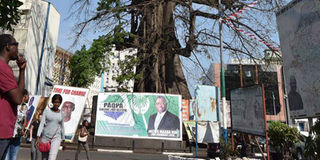Democratic maturity a test in the Sierra Leone election

Candidates for Sierra Leone's presidential election hang their posters in Freetown, on March 3, 2018. PHOTO | ISSOUF SANOGO | AFP
What you need to know:
- The Sierra Leone polls will be viewed as a barometer of the region’s evolving democratic maturity.
- Ethiopia is frantically seeking a prime minister to replace Hailemariam Desalegn, who resigned last month.
The countdown has begun for Sierra Leone’s long-awaited general election slated for March 7, which will be the third one for the country since it came out of a devastating civil war in 2002.
The poll will also be the fifth since the country returned to multiparty democracy in 1996, and is expected to usher in a replacement for incumbent Ernest Bai Koroma, who has served two five-year constitutional terms and is ineligible to stand.
Given the peaceful transition of power in such west African countries as Gambia, Ghana and Liberia during the past two years, the Sierra Leone polls will be viewed as a barometer of the region’s evolving democratic maturity.
They will be closely monitored by international observers deployed for the purpose by such agencies as the European Union, the Commonwealth and the African Union.
ETHIOPIA
Poignantly, the elections will be held when Ethiopia is frantically seeking a prime minister to replace Hailemariam Desalegn, who resigned last month.
A day after his resignation the council of ministers declared a six-month nationwide state of emergency, barely months after an earlier one ended.
The decree came amid a growing political crisis and divisions in the ruling Ethiopian People’s Revolutionary Democratic Front party (EPRD) that have raised uncertainty about Ethiopia's future stability.
In the latest sign of fractures within the all-powerful ruling coalition, on Friday Parliament approved the latest state of emergency despite unusual opposition from some lawmakers.
STATE OF EMERGENCY
The decree had earlier been condemned by several of Ethiopia’s allies and required approval by two-thirds of the lawmakers.
In the event the ruling party and its associated parties, which together control all the seats in the 547-member legislature, passed the decree with 346 votes in favour.
As a sign of the divisions prevailing in the country, 88 MPs voted against the measure, a few were absent, some abstained and 98 who were present did not vote.
The situation was markedly different from what followed the last emergency decree on October 2016, which followed months of anti-government protests from the country’s two largest ethnic groups, the Oromo and the Amhara.





